Please fill out the following information, and RRFC Admissions will contact you to discuss our program offerings:
Issue #133
by L. Swift and Jeff McQ
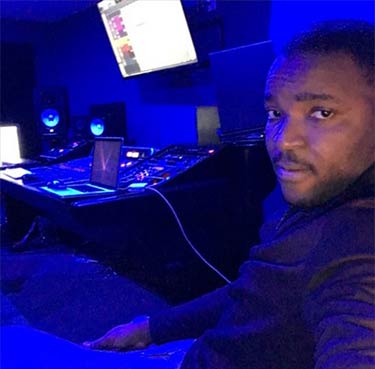 When he first came to the Recording Connection, Oluyomi Osh had already achieved a measure of success. A self-taught music producer, he specialized in Afrobeat, had already accumulated a roster of paid clients, and had even done recordings for some A-list gospel artists in his home country of Nigeria. But he wanted to learn more of the engineering side, and he knew enough to know he needed to fill in some gaps in order to up his game. He also knew he needed time in the studio with a real professional.
“All the previous knowledge I had before was all self-learned,” he says. “I needed a hands-on approach like to see the process all the professionals went through.”
Oluyomi already knew about the Recording Connection from his research online, so when he made the decision to relocate to the United States last year, we were already at the top of his list. Even so, when he went in for his initial interview with mentor Jake Grotticelli at House Studios in the Washington, DC area, he was a bit overwhelmed.
“I was blown away,” he says. “House Studio is definitely a great place to study, to apprentice with…The people there, they are welcoming and they pay attention to detail, like they put you through the very process, they give you the time and all.”
It gets better. Oluyomi happened to start his apprenticeship at a key moment when Grammy-nominated R&B artist Carolyn Malachi was in the studio to record an album.
“That actually went a long way for me because I got to be in most of the sessions,” he says, “and saw what the whole process was like, Jake’s approach to recording and finalizing mixes and all. And I actually almost took part in the recording process…because she asked me to go do a voice over on one of the tracks. I was too shy.”
Oluyomi says watching his mentor work on the project was one of the keys to improving his own skills. For example: “There was Jake’s approach to setting mix bus processes which [I] had not previously ventured into,” he says. “Seeing him work the way he did actually opened my eyes up to his approach and how to put that into my own work flow.”
He also saw the importance of getting things right during the recording process, as opposed to the idea of fixing it in the mix. “When you have garbage in, definitely you have garbage out,” he says. “It all starts from basically your arrangement to the end process. From process to process, it all has to be on point.”
But perhaps the most valuable part of the process for Oluyomi was when he could take his own mixes in from his clients to have Jake work with him on them. “I already have clients which I worked with back home….all paid gigs,” he says, “so I got the opportunity to improve on my sound having those projects to work on…From time to time, I had the opportunity to be in the studio…my lesson days with Jake, and just do a few revisions on some mixes, and he told me, ‘Okay. Do this.’ And sometimes I get to hear what my mixes sound like there and make adjustments.”
It didn’t take long after graduation for Oluyomi’s training to pay off, as he had the opportunity to engineer some tracks for Nigerian gospel artist Frank Edwards for his album Frankincense. Within 24 hours of the album’s release, it shot to Number 1 on iTunes in Africa!
“I had the connection from back home,” says Oluyomi. “He knew that I already put myself into a professional program and called me.”
And Oluyomi isn’t stopping there. He’s jumping into his new, revitalized career with both feet.
“My immediate plans are setting up my own rig, setting up my own studio. I’ve already started the process,” he says. “And I’m in the process of registering the business name, as well. And I’m stopping my full-time job to make this full-time already. I’m already putting everything together.”
When he first came to the Recording Connection, Oluyomi Osh had already achieved a measure of success. A self-taught music producer, he specialized in Afrobeat, had already accumulated a roster of paid clients, and had even done recordings for some A-list gospel artists in his home country of Nigeria. But he wanted to learn more of the engineering side, and he knew enough to know he needed to fill in some gaps in order to up his game. He also knew he needed time in the studio with a real professional.
“All the previous knowledge I had before was all self-learned,” he says. “I needed a hands-on approach like to see the process all the professionals went through.”
Oluyomi already knew about the Recording Connection from his research online, so when he made the decision to relocate to the United States last year, we were already at the top of his list. Even so, when he went in for his initial interview with mentor Jake Grotticelli at House Studios in the Washington, DC area, he was a bit overwhelmed.
“I was blown away,” he says. “House Studio is definitely a great place to study, to apprentice with…The people there, they are welcoming and they pay attention to detail, like they put you through the very process, they give you the time and all.”
It gets better. Oluyomi happened to start his apprenticeship at a key moment when Grammy-nominated R&B artist Carolyn Malachi was in the studio to record an album.
“That actually went a long way for me because I got to be in most of the sessions,” he says, “and saw what the whole process was like, Jake’s approach to recording and finalizing mixes and all. And I actually almost took part in the recording process…because she asked me to go do a voice over on one of the tracks. I was too shy.”
Oluyomi says watching his mentor work on the project was one of the keys to improving his own skills. For example: “There was Jake’s approach to setting mix bus processes which [I] had not previously ventured into,” he says. “Seeing him work the way he did actually opened my eyes up to his approach and how to put that into my own work flow.”
He also saw the importance of getting things right during the recording process, as opposed to the idea of fixing it in the mix. “When you have garbage in, definitely you have garbage out,” he says. “It all starts from basically your arrangement to the end process. From process to process, it all has to be on point.”
But perhaps the most valuable part of the process for Oluyomi was when he could take his own mixes in from his clients to have Jake work with him on them. “I already have clients which I worked with back home….all paid gigs,” he says, “so I got the opportunity to improve on my sound having those projects to work on…From time to time, I had the opportunity to be in the studio…my lesson days with Jake, and just do a few revisions on some mixes, and he told me, ‘Okay. Do this.’ And sometimes I get to hear what my mixes sound like there and make adjustments.”
It didn’t take long after graduation for Oluyomi’s training to pay off, as he had the opportunity to engineer some tracks for Nigerian gospel artist Frank Edwards for his album Frankincense. Within 24 hours of the album’s release, it shot to Number 1 on iTunes in Africa!
“I had the connection from back home,” says Oluyomi. “He knew that I already put myself into a professional program and called me.”
And Oluyomi isn’t stopping there. He’s jumping into his new, revitalized career with both feet.
“My immediate plans are setting up my own rig, setting up my own studio. I’ve already started the process,” he says. “And I’m in the process of registering the business name, as well. And I’m stopping my full-time job to make this full-time already. I’m already putting everything together.”
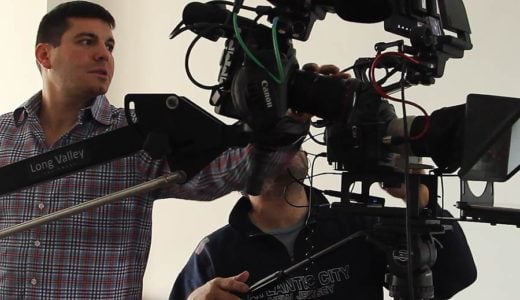 RRFC: So let’s talk about your journey into film and video production–how you became interested, your training, and how you ended up starting your own company.
Adam Lebenstein: When I went to college, my goal was to become a sports broadcaster. And I went to Ithaca College, and I did some sports radio, and I hosted some television there. And while I was hosting television, I kind of got into all aspects of it, the cameras, and what it takes to really produce a show, rundowns of scripts, and seeing it all come together, and I enjoyed the producing part of it…Then at my first job out of school, a startup TV network called College Sports Television, what kind of caught my eye was the features department, which was doing short stories on athletes. And they would send a few people out there with a camera and a microphone, basically, and send them around the country, telling these short stories on athletes. So that was kind of where I determined I wanted to be, and I kind of weaseled my way into that department, from originals to features. So I got a lot of cool experience traveling around and being part of larger crews and seeing how these guys who were a year or two ahead of me were doing it with lighting the interviews, and all the aspects of it. So I was doing that for a couple years. And then an opportunity at another company came up to be part of a series that aired on the NFL Network…and I stayed with that company and worked on events for them and different sorts of programming that I hadn’t really done before. It was kind of a permalance position over there. That’s when I launched my own production company…I just kind of went out there and started hustling and building my company.
RRFC: What was it about the features that you really liked? What was it that spoke to you?
Adam: I think it was kind of the storytelling aspect of it. A little bit of it was the excitement…was getting out of the office and kind of being on set, being out with people, meeting new people. And you really got to see all aspects of production. You got to see it all together because you would shoot it, and then you would take that back and work with an editor and put your piece together. The nature of it was definitely exciting as well.
RRFC: You said you sort of “weaseled” your way into features. What did you do to be proactive? How did you get yourself onto that team?
Adam: Well, I think buying my own camera, which was the same as the one they were using was kind of a neat little trick because things would come up where they would [say], “Oh, everyone is booked on something. Where can we turn next?” And there I am, smiling, holding up the box my camera came in. So it almost forced them into throwing me out there when I wasn’t quite ready…You’re right about just being proactive, just telling other people what you want to do, and keeping an ear out when other people are on the phone and maybe discussing a problem or saying, “Oh, I don’t know who could do that.” And kind of being around there to volunteer and say, “Oh, I could tag along. Send me out there.” That sort of thing.
RRFC: So in the past few years, entrepreneurship has become such a huge thing in this business. As you started your company, were you seeing the changes in the culture, and how did you adapt?
Adam: The big thing was kind of the move to digital. It was every company needing a website. And you couldn’t really predict the video explosion, but you knew that there needed to be low budget video solutions that weren’t just for a TV platform. I think that’s kind of…I kind of hit it at the right time where there was a huge audience of people who needed web video, and it was growing by the day. And that was kind of what I was playing towards, was servicing that…As I got more and more experiences and moved into this corporate world, I had more agency experience and marketing company experience. Agencies are very niche and they’re set up that way. It’s like, “We have our creatives. We have our art director. We have our copywriters. Copywriter writes. Art director does the art, does the visuals.” They kind of look at production that way….But that’s not how I look at things. I look at my greatest asset being resourcefulness. Whatever your need is, I’m going to find a great solution for it.
RRFC: How does all this tie in to the experience your Film Connection students receive when apprenticing with you?
Adam: The experience you get when you become a part of our company is [that] you’re not going to be doing the same thing every day. You’re not going to just be sitting there going through your chapters. You’re going to go on 10 shoots that are all very different. Some of them are sit-down interviews. Some of them are what some people would consider boring, maybe filming somebody working at a computer screen. And some of them are bigger budget productions with weeks of preparation and prop creation and set design. All sorts of things like that are projects we’re working on right now. You’re not going to get a single-track experience…You definitely see all the different parts that go into this industry when you come work here.
RRFC: Can you tell us about some of your students and how they’ve done?
RRFC: So let’s talk about your journey into film and video production–how you became interested, your training, and how you ended up starting your own company.
Adam Lebenstein: When I went to college, my goal was to become a sports broadcaster. And I went to Ithaca College, and I did some sports radio, and I hosted some television there. And while I was hosting television, I kind of got into all aspects of it, the cameras, and what it takes to really produce a show, rundowns of scripts, and seeing it all come together, and I enjoyed the producing part of it…Then at my first job out of school, a startup TV network called College Sports Television, what kind of caught my eye was the features department, which was doing short stories on athletes. And they would send a few people out there with a camera and a microphone, basically, and send them around the country, telling these short stories on athletes. So that was kind of where I determined I wanted to be, and I kind of weaseled my way into that department, from originals to features. So I got a lot of cool experience traveling around and being part of larger crews and seeing how these guys who were a year or two ahead of me were doing it with lighting the interviews, and all the aspects of it. So I was doing that for a couple years. And then an opportunity at another company came up to be part of a series that aired on the NFL Network…and I stayed with that company and worked on events for them and different sorts of programming that I hadn’t really done before. It was kind of a permalance position over there. That’s when I launched my own production company…I just kind of went out there and started hustling and building my company.
RRFC: What was it about the features that you really liked? What was it that spoke to you?
Adam: I think it was kind of the storytelling aspect of it. A little bit of it was the excitement…was getting out of the office and kind of being on set, being out with people, meeting new people. And you really got to see all aspects of production. You got to see it all together because you would shoot it, and then you would take that back and work with an editor and put your piece together. The nature of it was definitely exciting as well.
RRFC: You said you sort of “weaseled” your way into features. What did you do to be proactive? How did you get yourself onto that team?
Adam: Well, I think buying my own camera, which was the same as the one they were using was kind of a neat little trick because things would come up where they would [say], “Oh, everyone is booked on something. Where can we turn next?” And there I am, smiling, holding up the box my camera came in. So it almost forced them into throwing me out there when I wasn’t quite ready…You’re right about just being proactive, just telling other people what you want to do, and keeping an ear out when other people are on the phone and maybe discussing a problem or saying, “Oh, I don’t know who could do that.” And kind of being around there to volunteer and say, “Oh, I could tag along. Send me out there.” That sort of thing.
RRFC: So in the past few years, entrepreneurship has become such a huge thing in this business. As you started your company, were you seeing the changes in the culture, and how did you adapt?
Adam: The big thing was kind of the move to digital. It was every company needing a website. And you couldn’t really predict the video explosion, but you knew that there needed to be low budget video solutions that weren’t just for a TV platform. I think that’s kind of…I kind of hit it at the right time where there was a huge audience of people who needed web video, and it was growing by the day. And that was kind of what I was playing towards, was servicing that…As I got more and more experiences and moved into this corporate world, I had more agency experience and marketing company experience. Agencies are very niche and they’re set up that way. It’s like, “We have our creatives. We have our art director. We have our copywriters. Copywriter writes. Art director does the art, does the visuals.” They kind of look at production that way….But that’s not how I look at things. I look at my greatest asset being resourcefulness. Whatever your need is, I’m going to find a great solution for it.
RRFC: How does all this tie in to the experience your Film Connection students receive when apprenticing with you?
Adam: The experience you get when you become a part of our company is [that] you’re not going to be doing the same thing every day. You’re not going to just be sitting there going through your chapters. You’re going to go on 10 shoots that are all very different. Some of them are sit-down interviews. Some of them are what some people would consider boring, maybe filming somebody working at a computer screen. And some of them are bigger budget productions with weeks of preparation and prop creation and set design. All sorts of things like that are projects we’re working on right now. You’re not going to get a single-track experience…You definitely see all the different parts that go into this industry when you come work here.
RRFC: Can you tell us about some of your students and how they’ve done?
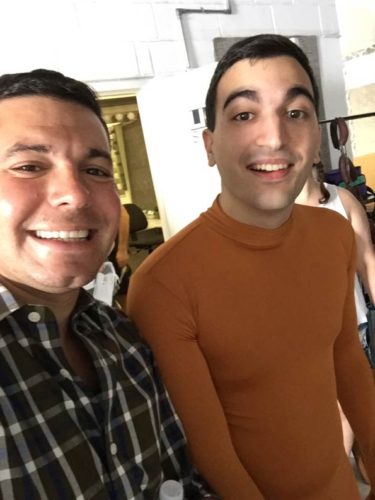
Adam Lebenstein and FC student Anthony Zaccardi on the set of a Tum’s commercial
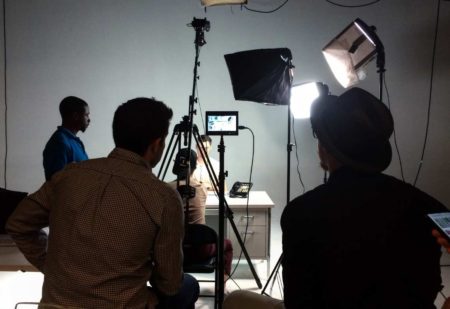 Film Connection student Nate Crockett (Charleston, SC) is looking forward to traveling with the crew at Block One Studios in coming months: “I love The Film Connection’s program so far. I recently graduated from high school, now I’m focused on getting my name out into the film industry. I’ve learned about my favorite directors and movies, as well as some interesting films I’ve never heard of. I’m very glad I found out about this program and excited to continue my work as a student. The other day my mentor told me I’d be going to Manhattan with them to film. We’ll be there for five days in September, filming a seminar. They also told me that they’ll be bringing me to Virginia where we’ll be filming a feature in December. I’m beyond excited for these opportunities and I’m very thankful for them!”
Film Connection student Nate Crockett (Charleston, SC) is looking forward to traveling with the crew at Block One Studios in coming months: “I love The Film Connection’s program so far. I recently graduated from high school, now I’m focused on getting my name out into the film industry. I’ve learned about my favorite directors and movies, as well as some interesting films I’ve never heard of. I’m very glad I found out about this program and excited to continue my work as a student. The other day my mentor told me I’d be going to Manhattan with them to film. We’ll be there for five days in September, filming a seminar. They also told me that they’ll be bringing me to Virginia where we’ll be filming a feature in December. I’m beyond excited for these opportunities and I’m very thankful for them!”
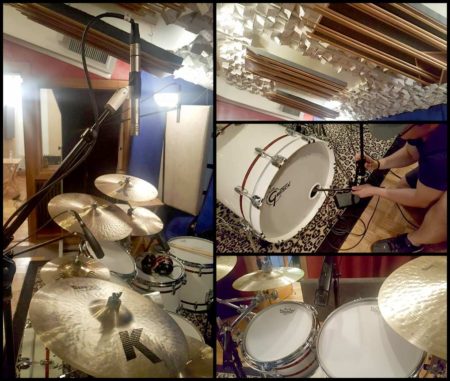 Recording Connection student Kelly Bazely (Nashville, TN) was told to take the plunge into mics by mentor Ric Web at South Street Studios: “After our lesson, Ric actually sent me to his other studio to watch a professional band get set up by some professional sound engineers. They showed me what mics they used for each instrument, and how to set them up. It was slightly overwhelming, but I took lots of notes and pictures to help me remember everything…I learned about the difference between dynamic and condenser microphones, and which ones are best for which instruments and scenarios…I also got to see the sound engineers measure the distance from the center of the snare drum to the microphone with a cable to make sure the microphones from the drum set were both equal distance apart from the snare drum. The wood chunks on the ceiling of the recording room were also really cool, and were placed there for acoustics. Looking forward to continuing the sound engineering journey!”
Recording Connection student Kelly Bazely (Nashville, TN) was told to take the plunge into mics by mentor Ric Web at South Street Studios: “After our lesson, Ric actually sent me to his other studio to watch a professional band get set up by some professional sound engineers. They showed me what mics they used for each instrument, and how to set them up. It was slightly overwhelming, but I took lots of notes and pictures to help me remember everything…I learned about the difference between dynamic and condenser microphones, and which ones are best for which instruments and scenarios…I also got to see the sound engineers measure the distance from the center of the snare drum to the microphone with a cable to make sure the microphones from the drum set were both equal distance apart from the snare drum. The wood chunks on the ceiling of the recording room were also really cool, and were placed there for acoustics. Looking forward to continuing the sound engineering journey!”

RRFC is education upgraded for the 21st century.
Get the latest career advice, insider production tips, and more!
Please fill out the following information, and RRFC Admissions will contact you to discuss our program offerings:
Stay in the Loop: Subscribe for RRFC news & updates!
© 2025 Recording Radio Film Connection & CASA Schools. All Rights Reserved.


